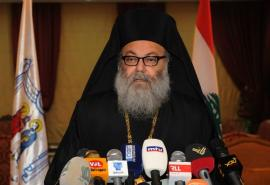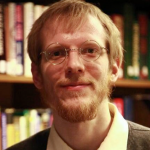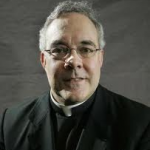Deprecated: trim(): Passing null to parameter #1 ($string) of type string is deprecated in
/home/aoiusa/public_html/wp-content/plugins/sexybookmarks/public.php on line
388
Deprecated: trim(): Passing null to parameter #1 ($string) of type string is deprecated in
/home/aoiusa/public_html/wp-content/plugins/sexybookmarks/public.php on line
394
Deprecated: trim(): Passing null to parameter #1 ($string) of type string is deprecated in
/home/aoiusa/public_html/wp-content/plugins/sexybookmarks/public.php on line
400
Source: National Review Online | Samuel J. Gregg
 If there is anyone in the world today who embodies the joy of the Christian Gospel, it is Jorge Mario Bergoglio. And the happiness offered by embracing and living true faith in Christ and His Church (rather than the vapid sentimentalism that often passes for love these days) permeates Pope Francis’s new (and rather long) “apostolic exhortation,” Evangelii Gaudium, from beginning to end. Reading the text, one does experience a profound sense of just how life-transforming belief in Christ should be.
If there is anyone in the world today who embodies the joy of the Christian Gospel, it is Jorge Mario Bergoglio. And the happiness offered by embracing and living true faith in Christ and His Church (rather than the vapid sentimentalism that often passes for love these days) permeates Pope Francis’s new (and rather long) “apostolic exhortation,” Evangelii Gaudium, from beginning to end. Reading the text, one does experience a profound sense of just how life-transforming belief in Christ should be.
Evangelii Gaudium is in many ways a beautiful document. The emphasis upon the Trinity’s most neglected member — the Holy Spirit — in the Church’s life is especially inspiring. Then there are the practical insights about how to breathe life into aspects of the Church’s evangelical outreach that have long been moribund (as in the content-free homilies routinely endured by many Catholics in Western countries). Also helpful for theological reflection, as well as an outline for an agenda of internal reform, are Francis’s comments on how to develop greater collegiality between Rome and what Catholics call the local churches.
For all that, however, important sections of Evangelii Gaudium will strike many Catholics as less than convincing. To be very frank (which Francis himself is always encouraging us to be), a number of claims made by this document and some of the assumptions underlying those statements are rather questionable.
Some, for example, will single out the pope’s remark that “authentic Islam and the proper reading of the Koran are opposed to every form of violence” (253). As one of the most authoritative Catholic commentators on Islam, Pope Francis’s fellow Jesuit Samir Khalil Samir (who is no knee-jerk anti-Muslim), writes in his 111 Questions on Islam (2002), Westerners who assert that groups like the Taliban are acting in a manner contrary to the spirit of Islam “usually know little about Islam.” In the Egyptian-born Jesuit’s view, “On the sociohistorical level, from the Qur’an onward, the ordinary meaning of jihad is unequivocal. [It] indicates the Muslim war in the name of God to defend Islam.” Later in the same book, Father Samir underscores that, alongside one tradition in Islam of somewhat limited tolerance towards Jews and Christians (polytheists and atheists aren’t extended the same consideration), there is an equally valid tradition that “prefers the verses” in the Koran and the sunna “that encourage violence.” Both, the Beirut-resident priest adds, are legitimate Muslim readings of Islam’s view of violence. Ergo, we — and Islam — have a problem.
Specialists in Islam will no doubt elaborate on these matters. My purpose, however, is to focus upon some of the many economic reflections that loom large throughout Evangelii Gaudium and which are, I’m afraid, very hard to defend. In some cases, they reflect the straw-man arguments about the economy that one encounters far too often in some Catholic circles, especially in Western Europe but also in Latin America.
Prominent among these is the pope’s condemnation of the “absolute autonomy of markets” (202). This, he firmly believes, is at the root of many of our contemporary problems, not least because it helps rationalize an unwillingness to assist those in need.
If, however, we follow Evangelii Gaudium’s injunction (231–233) to look at the realities of the world today, we will soon discover that there is literally no country in which markets operate with “absolute autonomy.” In most Western European countries, for instance, governments routinely control an average of 40 percent of their nations’ GDP. In many developing countries, the percentage is even higher. How much more of the economy do we really want to put into the state’s hands? Is there no upper limit? In private correspondence with the British-Australian economist Colin Clark, for example, even John Maynard Keynes suggested that the figure of “25 percent [of GDP] as the maximum tolerable proportion of taxation may be exceedingly near the truth.”
Nor does there appear to be any consciousness in Evangelii Gaudium of just how regulated most of the world’s economies are. The rules and regulations that apply, for instance, to economic life in North America and Western Europe are fast approaching the status of beyond counting. The situation in most developing countries is hardly any better. So extensive is the range and scope of regulation that, as I’ve argued elsewhere, it is now creating genuine rule-of-law problems in many countries. The amount of regulation affecting developed Western economies is now so great that it is likely that even good judges with no interest in judicial activism are issuing rulings that are ad hoc and arbitrary in nature.
Another claim made by Evangelii Gaudium that warrants scrutiny is that certain ideologies “reject the right of states, charged with vigilance for the common good, to exercise any form of control” over the economy (56). But outside the minuscule world of anarcho-capitalists (who exert zero influence upon public policy), this simply isn’t the position of those who favor free markets today (let alone past advocates like Adam Smith). It’s one thing to be skeptical of the efficaciousness of various, even many, forms of government intervention into the economy, and quite another to reject any form of regulation whatsoever.
Alongside these comments, we find Francis critiquing those who “continue to defend trickle-down theories which assume that economic growth, encouraged by a free market, will inevitably succeed in bringing about greater justice and inclusiveness in the world.” Such a view, the pope adds, “which has never been confirmed by the facts, expresses a crude and naïve trust in the goodness of those wielding economic power and in the sacralized workings of the prevailing economic system” (54). More generally, the pope states, “We can no longer trust in the unseen forces and the invisible hand of the market” (204).
There are several problems with this line of reasoning. First, opening up markets throughout the world has helped to reduce poverty in many developing nations. East Asia is a living testimony to that reality — a testimony routinely ignored by many Catholics in Western Europe (who tend to complain rather self-centeredly about the competition it creates for protected Western European businesses and other recipients of corporate welfare) and a reality about which I have found many Latin American Catholics simply have nothing to say.
Second, it has never been the argument of most of those who favor markets that economic freedom and free exchange are somehow sufficient to reduce poverty. These things are certainly indispensable (witness the failure of planned economies to solve the problem of scarcity), but they’re not enough. Among other things, stable governments that provide infrastructure, property arrangements that identify clearly who owns what, and, above all, the rule of law are just as essential.
It hardly need be said that rule of law (mentioned not once in Evangelii Gaudium) is, to put it mildly, a “challenge” in most developing nations. The lack of rule of law not only ranks among the biggest obstacles to their ability to generate wealth on a sustainable basis, but also hampers their capacity to address economic issues in a just manner. Instead, what one finds is crony capitalism, rampant protectionism, and the corruption that has become a way of life in much of Africa and Latin America.
Far from insisting that the invisible hand (a metaphor employed by Smith that merits a separate discussion in itself) is somehow enough, many market-oriented scholars have been underscoring for several decades the vital importance of values and institutions in explaining the causes of economic growth and decline. Nobel-laureate economists such as Edmund Phelps and Douglass North have deepened our knowledge of how the values, expectations, beliefs, rules, and informal protocols that define a given economic culture help determine (1) whether a country can break the bonds of poverty, or (2) whether it goes from wealth to seemingly perpetual decline (Pope Francis’s native Argentina being the 20th century’s Exhibit A of such decline), or (3) whether it simply enters a state of prolonged stagnation like Japan in the 1990s and 2000s or much of Western Europe today.
Lastly, there is the issue of redistribution. In numerous places, Francis calls for a more equitable distribution of resources within and between societies. He quotes, for instance, the bishops of Brazil to the effect that “hunger is the result of a poor distribution of goods and income” (191).
Of course, Catholicism has, from the very beginning, emphasized that private property is not absolute. It has also always affirmed that the state has a role to play in ensuring a more just distribution of wealth. To this, Francis adds that some people today find any mention of the distribution of income to be “irksome” (203).
Personally speaking, I don’t find discussions of wealth distribution to be bothersome at all. Catholics, other Christians, and other people of good will should, in my view, enter enthusiastically into such debates. Because it is precisely through these conversations that it can be pointed out that — as Evangelii Gaudium seems, alas, unaware — many poverty-alleviation methods that involve redistribution (such as foreign aid) are increasingly discredited. As the economist and historian of the Federal Reserve Allan Meltzer put it, one of the 20th century’s economic lessons is that “transfers, grants and redistribution did little to raise living standards in Asia, Latin America and Africa.” In other words, the standard wealth-redistribution policies that are often regarded as indispensable to poverty alleviation have failed to achieve their goals. Hence it behooves all Catholics to ask ourselves why such approaches have failed if we’re going to have a serious conversation about wealth and poverty in the modern world.
My critique is by no means intended to imply that all of Pope Francis’s observations about economic life are naïve or simply mistaken. As it happens, he says several things that will resonate with those who favor free enterprise and markets. The pope states, for instance, that welfare projects should be seen as “temporary responses” (202) and warns against the “welfare mentality” (204). Evangelii Gaudium extols “free” and “creative” work (192). Francis also affirms that business “is a noble vocation” that serves “the common good by striving to increase the goods of this world and to make them more accessible to all” (203).
Likewise, the pope’s warnings about, for example, the tendency for even many Christians to immerse themselves in a culture of prosperity for its own sake are well taken. In his own lifestyle, Pope Francis has long been a living reproach to those who think salvation is to be found in the possession, use, and accumulation of stuff. Equally important is Evangelii Gaudium’s reference to the way in which “debt and the accumulation of interest” make it “difficult for countries to realize the potential of their own economies and keep citizens from enjoying their real purchasing power” (56).
And yet for all these and other observations, it is difficult not to come away from reading Evangelii Gaudium thinking that there are just too many unexamined assumptions about the economy that have made their way into this document. Indeed, towards the end of his more direct economic observations, the pope seems to indicate his awareness that some of his thoughts about poverty and economics will generate criticism. “If anyone feels offended by my words,” he says, “I would respond that I speak them with affection and with the best of intentions, quite apart from any personal interest or political ideology” (208). Instead, Francis writes, he is concerned with ensuring that people don’t succumb to the type of self-enclosed individualism that produces injustice and ultimately kills the soul.
I myself take no offense from Evangelii Gaudium’s observations about poverty and the economy. In fact I admire Francis’s determination to ensure that we don’t lose sight of the material misery in which far too many people continue to live. His words are also a powerful reminder that Christ’s commandment to love the poor is truly non-negotiable for any serious Christian.
Nevertheless, as Francis himself writes, “Ideas disconnected from realities give rise to ineffectual forms of idealism” (232). And attention to particular realities about economic life is precisely what’s missing from parts of Evangelii Gaudium’s analysis of wealth and poverty. If we want “the dignity of each human person and the pursuit of the common good” to be more than what the pope calls a “mere addendum” to the pursuit of “true and integral development” (203), then engaging more seriously the economic part of the truth that sets us free would be a good start.
Everyone would gain — and not least those who endure poverty.
— Samuel Gregg is research director at the Acton Institute and author of, among other books, Becoming Europe and Tea Party Catholic.

 Last night syndicated columnist Terry Mattingly and myself (Fr. Hans Jacobse) discussed where religious freedom in America was under assault. The discussion was, I believe, informative. I was very impressed with Mattingly’s comprehensive knowledge and analysis of the legal challenges concerning religious liberty. The discussion focused on the moral issues, particularly gay rights, as the locus of the conflict.
Last night syndicated columnist Terry Mattingly and myself (Fr. Hans Jacobse) discussed where religious freedom in America was under assault. The discussion was, I believe, informative. I was very impressed with Mattingly’s comprehensive knowledge and analysis of the legal challenges concerning religious liberty. The discussion focused on the moral issues, particularly gay rights, as the locus of the conflict. 








